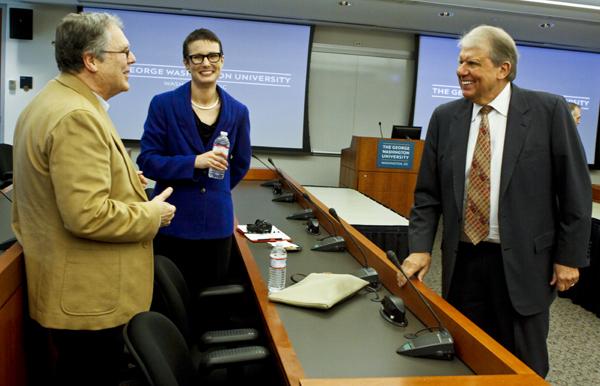The University is trying to increase research opportunities for graduate students by making it easier for professors to appoint them as project assistants
The move comes as GW, en route to becoming an improved research university, tries to shed outdated practices. Professors will be able to appoint graduate students as research assistants more informally, removing much of the administrative process Provost Steven Lerman said may have discouraged faculty from working with students in the past.
With fewer hiring hurdles, Lerman said GW would be “back in the mainstream,” which he added is crucial as GW strives to become a major research institution.
Currently, faculty members heading a research project must create positions for assistants through University Human Resources, categorizing students as University employees rather than students.
The process irked professors, with their frustration coming to a head at a Faculty Senate meeting earlier this month when economics professor Anthony Yezer threatened to pen a “nasty” resolution if administrators did not change the system. Lerman said then that he had just completed finalizing the changes that would alleviate their frustrations.
Starting in the fall, appointments will be approved by the Office of the Provost instead of human resources, and the graduate students’ employment will be contingent on their remaining a student.
The change could help as GW increases research efforts and pours money into science and engineering through a new $275 million building that will increase the number of research labs on campus.
Last year, the University inched into the top 100 research institutions in the National Science Foundation’s ranking. It has still, however, had to reverse processes that have held its research back – for instance, researchers have been pushing for GW to adopt updated software that tracks research grants year by year.
Vice President for Research Leo Chalupa said the current system for appointing research assistants – which he called “archaic” – was the result of years spent without a close eye on research.
“Because we haven’t been a major research force, there are a number of things like that just sort of slipped through the crack, and that needed to be fixed,” Chalupa said.
Lerman said it was difficult to tally the number of graduate students conducting research with faculty because most are paid by outside organizations, like the National Institutes of Health.
Creating positions for specific students will also help professors nab grants, Yezer said. Organizations such as the NSF, a major source of research funding for GW, place weight on grant applications that name the research assistants because they are more complete applications, he said.
Yezer said the change to consider research assistants as students instead of employees also was necessary because they are hired for a specific period of time, while University employees are expected to work for longer periods.
“We’re treating these people as if they’re just regular employees, and therefore they have the same benefits structure as people who would come here with the expectation they’re going to work here for 20 years. And again, that’s not just appropriate,” Yezer said.
–Mary Ellen McIntire contributed to this report







